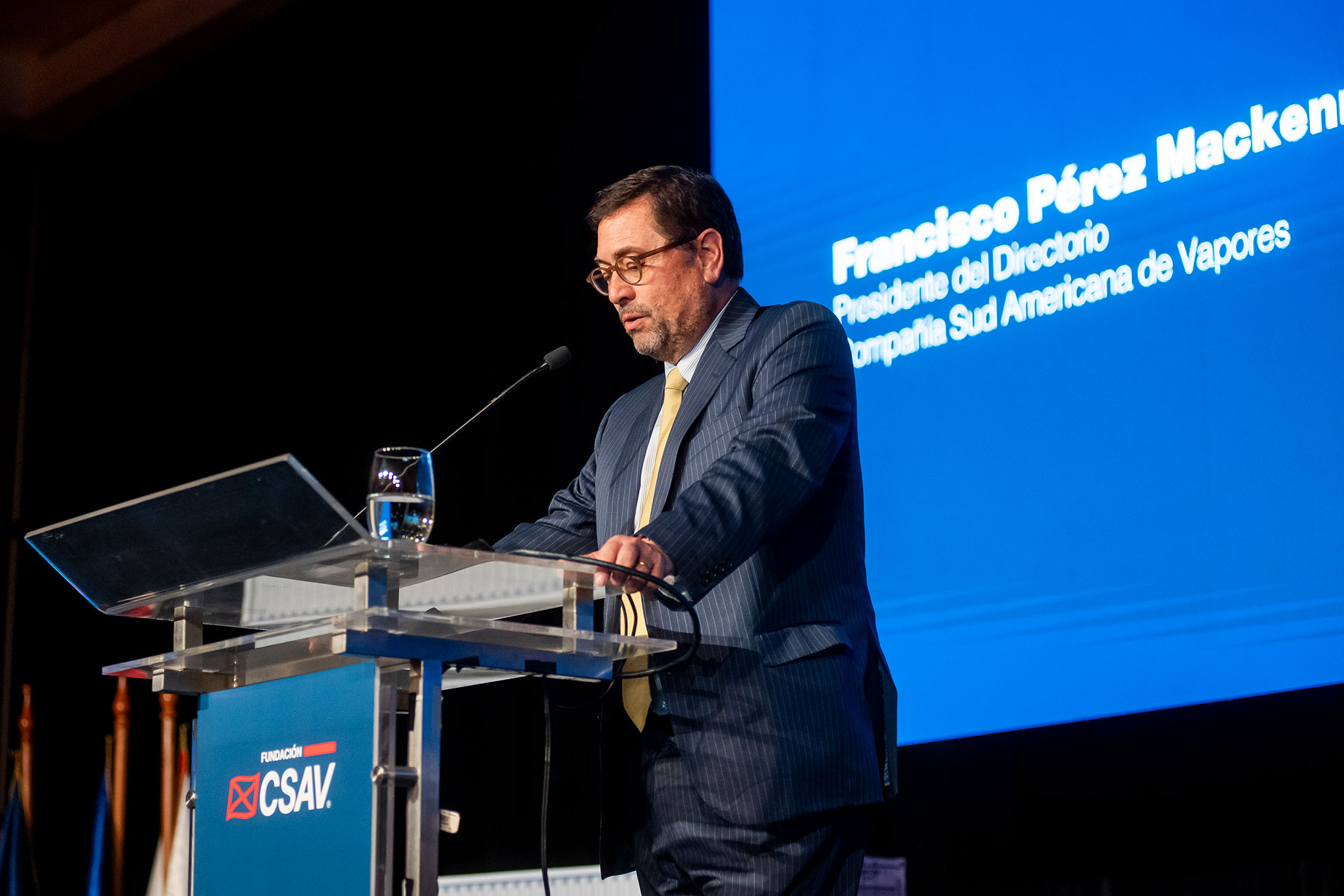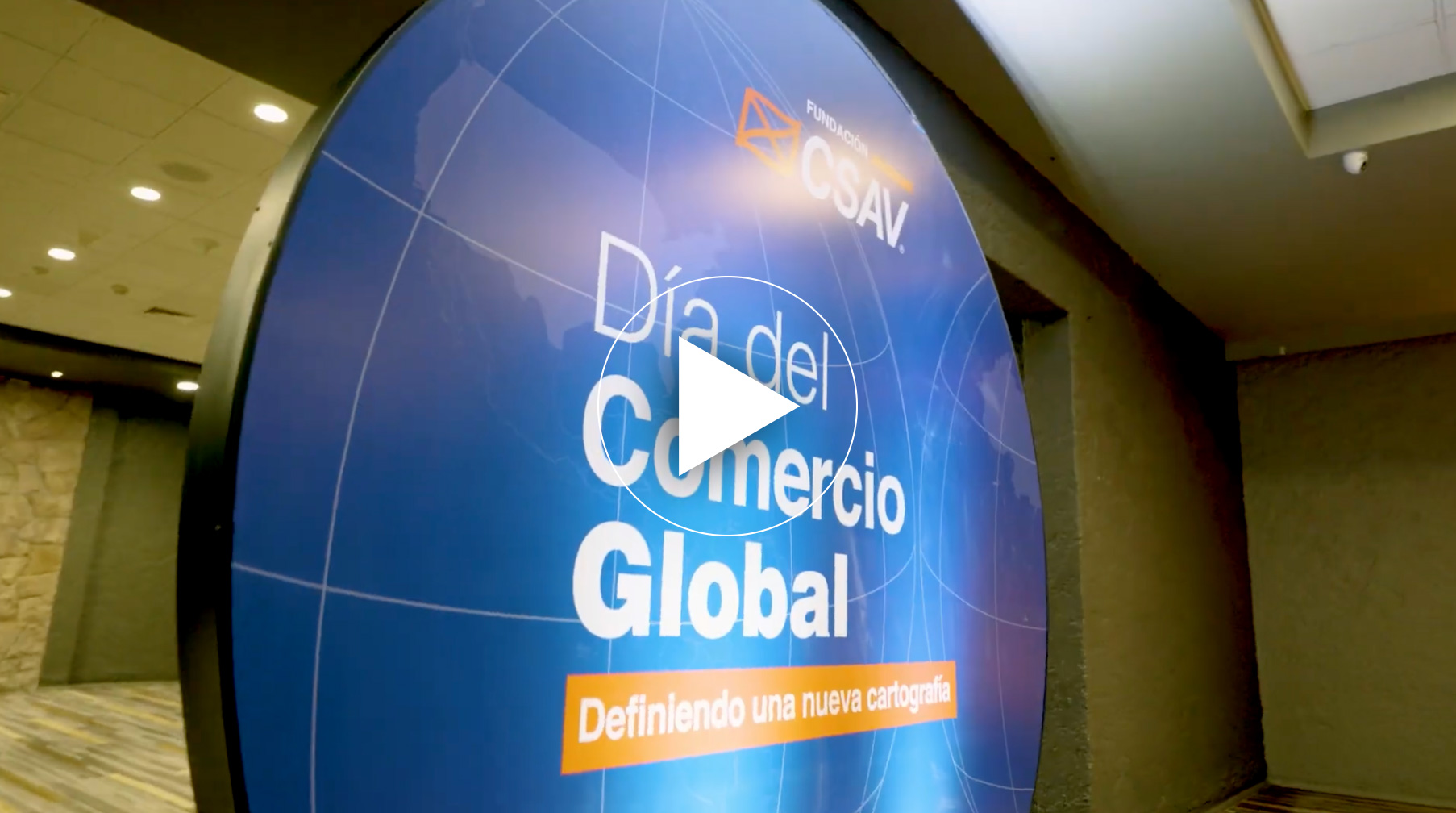At Global Trade Day, CSAV Foundation analyzes the new geopolitical scenario and the challenges for Chile
Former President Eduardo Frei said that “globalization will change, but it will never disappear” and called to “trust in Chile” to seize opportunities and consolidate a multi-export economy.
International experts, SalmonChile, and Frutas de Chile reviewed the new geopolitical map of trade, with the United States and China at the center of the trade war.

Santiago, October 15, 2025. The CSAV Foundation successfully held the fourth edition of Global Trade Day, a seminar focused on unraveling the new map of world trade and its implications for Chile, a country with an economy strongly integrated globally.
“Chile is a country open to the world, and its economy is directly linked to foreign trade. This year, we wanted to analyze in depth how geopolitical balances are changing, what is behind the decisions of the great powers, what is happening with key industries, and what spaces exist to navigate this new scenario,” said the foundation’s president, Óscar Hasbún.
Former President Eduardo Frei closed the event with a call to seize opportunities to consolidate Chile as a multi-export economy, which must be driven by a public-private partnership. He mentioned that the country’s main objective must be opening up to India, the largest population and an expanding market. Africa and Arab countries also offer new opportunities.
“The network of free trade agreements is one of the most powerful in the world. Globalization will change, but it will never disappear. We need a new cycle of economic growth; we have been stalled for ten years,” he said, adding that Chile has three major challenges: excessive permitting (permisología), security, and political reform.
He recalled that we are at the end of the port concessions cycle and there is an opportunity to review the objectives and visualize the infrastructure the country needs for the coming years. He proposed that a permanent institution is needed, one that transcends administrations and allows for effective planning.
The former president made a call to trust in Chile, assuring that “we did it before, we can do it again.” “For that [we need] determination, courage, conviction. The tools are there, so we have to stand up and prepare for takeoff,” he emphasized.
The International Perspective
The seminar began with presentations by Elizabeth Economy, an expert on China’s politics and economic development and co-chair of the Program on the U.S., China, and the World at Stanford University’s Hoover Institution; and Tomas Philipson, an economist and academic at the University of Chicago and former chairman of the White House Council of Economic Advisers during President Trump’s first term.
Philipson highlighted the United States’ efforts to control illegal immigration and organized crime. Regarding tariffs, he explained that they are a negotiating lever with countries to control trade flows. “What is sought is reciprocity and thus avoid current asymmetries,” he stated, adding that the focus is on Mexico, Canada, Europe, and China, which represent the majority of its trade.
“Chile can improve its situation if ways are found to favor the United States, that is the objective,” he said, and commented that one way is to open spaces for US companies in the country.
Economy, meanwhile, presented Xi Jinping’s vision, which includes transforming China into a global technological and economic power, consolidating its influence in Asia, and aligning other countries with its interests. She stated that the United States does not have a special agenda with China; the current situation is an effect of the America First policy.
“Chile could expect more pressure from the United States, especially in minerals, technology, and ports. Today there is an opportunity to take a step back to think about its values, its investments, and evaluate who its trading partners will be,” she said.
The Local Impact and Panama
Next, a panel moderated by the general secretary of SOFOFA, Rodrigo Yáñez, addressed the challenges faced by industries such as fruit and salmon. “Trade matters; exports contribute about half of Chile’s GDP,” he highlighted.
The president of SalmonChile, Arturo Clément, commented that tariffs have affected the industry because they have not been passed on to the price. “What we can manage are the ‘invisible tariffs’: the tangle of regulations that make us uncompetitive,” he affirmed.
For his part, the president of Frutas de Chile, Iván Marambio, said that for now, the impact of tariffs has existed, but it has not been decisive, while uncertainty persists. “We need to diversify and focus on the consumer: we must have the best product and the best consumption experience. We must also promote the Chile brand more forcefully.”
Both highlighted the value of having good public policies for the future development of Chile, with a common strategic vision.
Finally, the Minister for Panama Canal Affairs, José Ramón Icaza, spoke, presenting projects for the coming years, such as the Río Indio Lake works, with an estimated investment of nearly US$1.5 billion. To these are added the Energy Corridor, Port Terminals (Telfers and Corozal), and the Logistics Corridor. In this way, the canal can continue to efficiently support foreign trade.


